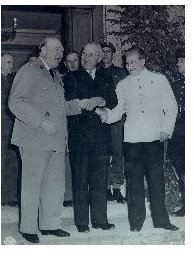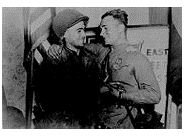Main Causes of The Cold War
What Caused The Cold War?
In the immediate aftermath of World War II, peace and friendship seemed to exist between the Soviet Union and the United States, at least amongst enlisted men from both sides. Images of soldiers from the two Allies meeting were publicized and the underlying differences in their nations’ ideologies were overlooked, just as they had been during the war.
But tensions emerged quickly and were exacerbated by economic and human losses. The Soviets had lost greater than twenty million lives during World War II and their leader, Joseph Stalin, was adamant in his quest for reparations and security for his nation. The differing political systems, war devastation, and the disagreements over rebuilding Europe were main causes of the Cold War.

The three leaders of the Allied Forces, FDR, Churchill, and Stalin gathered in Yalta in February of 1945 to discuss the future of Europe, especially Germany. By July of that year when the Allies again met in Potsdam, Germany, Churchill and the US president who succeeded Roosevelt following his death, Harry S. Truman, needed to restrain Stalin’s insistence on Soviet domination of Eastern European countries sitting on the USSR’s western border. Stalin wanted to absorb these nations and spread communism to them.
The next few years were marked by an escalation of this mutual hostility and distrust. Germany was split into four zones between the US, Soviet Union, France, and Britain. Berlin, the capital, was separated this way as well. Americans and Soviets stationed in the city witnessed the tension and antagonism first hand. Anatoly Semeriaga was a Soviet officer in Berlin helping those liberated from concentration camps. At first the focus was humanitarian but, according to Semiriaga, the shift to a political agenda was quick. Senior Soviet officers informed Semeriaga: “Listen, the Germans were not solely responsible for the war. It wasn’t just Hitler, it was the imperialist system. And who are the representatives of imperialism now? The allies we fought on the same side as against Hitler.” ((Hodgson, pp. 245) The fall of Hitler and fascism were just the beginning in the triumph of Socialism, they were told Eastern Europe which had been rescued by the Red Army during the war was deemed a prize for socialism The nations of Hungary, Poland, and Czechoslovakia were all under Soviet control at the close of WW II and soon after were made socialist.
Remarks made by Stalin in Moscow February of 1946 had a tone of war that prompted what came to be known as the “long telegram”. Written by a Soviet expert at the US embassy in Moscow, the long telegram advised containment of Soviet power. In March 1946, Winston Churchill gave a speech in Fulton, MO and coined the term “Iron Curtain”. Iron Curtain alluded to the string of Soviet totalitarian states that divided Europe. He encouraged an alliance between English speaking nations that could resist Soviet goals of expansion and power. The next year, 1947, Harry S Truman seemed to heed that advice in an official policy of containment. The Truman Doctrine, as it came to be known, stated that communist into other nations must and would be halted.The main causes of the cold war had revealed themselves quickly and would come to a head in 1948.
By 1948 Germany was in dire financial difficulty and the western powers (France, Britain, and the United States) wanted to alleviate the situation in two ways: combining their zones into one and expanding the currency reform that had worked miracles in the rest of West Germany into West Berlin. (This currency reform was known as Wirtschaftswunder meaning the economic miracle.) The Soviets responded by blocking western access to the city. Power was cut, highways and waterways blocked and trains were stopped. The west did not give in. Instead, the US and Britain began a twenty-four-hour operation of airlifts bringing in food and medical supplies to West Berlin. The blockade lasted for eleven months; the airlift lasted for four more months after the blockade was ended.
Germany became officially divided in 1949. West Germany formed a democratic government and became known as the Federal Republic of Germany. East Germany, the German Democratic Republic, was made part of the USSR. What caused the Cold War-divergent ideologies, the division of Europe and the losses suffered in World War II-had succeeded in splitting Europe an the world into two opposing camps.
References
Hodgson, Godfrey, (1998). People’s Century. New York, NY: Time Books.
Nelson, Rebecca, (2004). The Handy History Answer Book. Barnes & Noble Inc.
Image Credits
